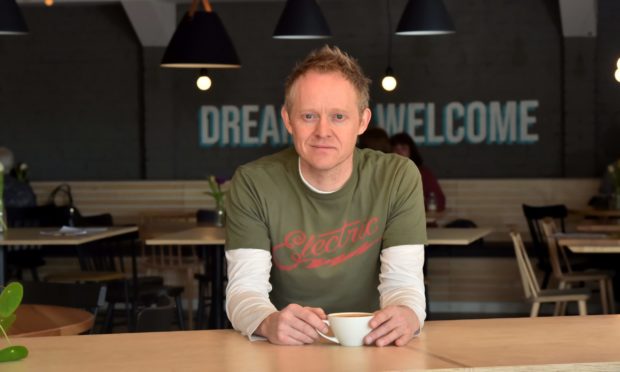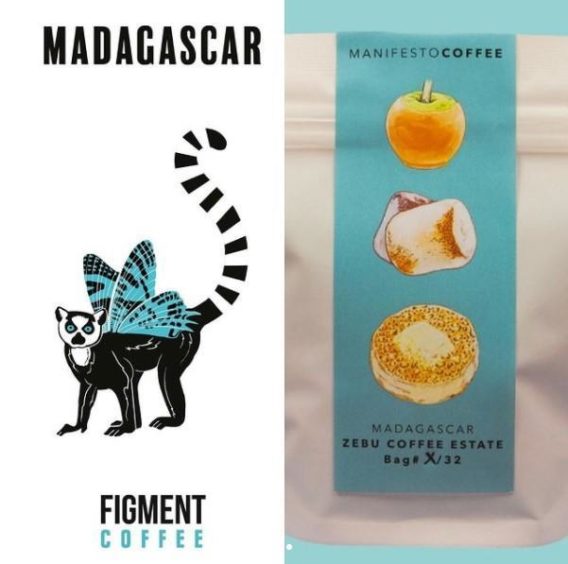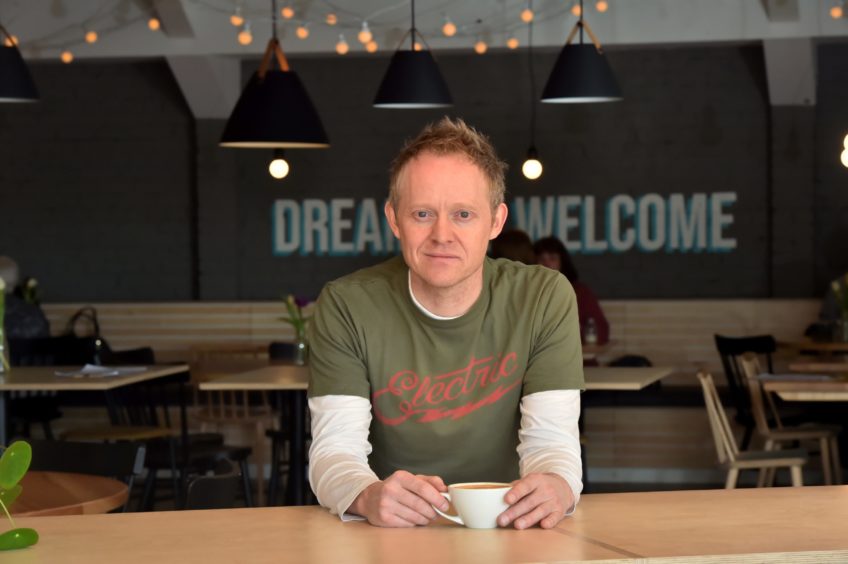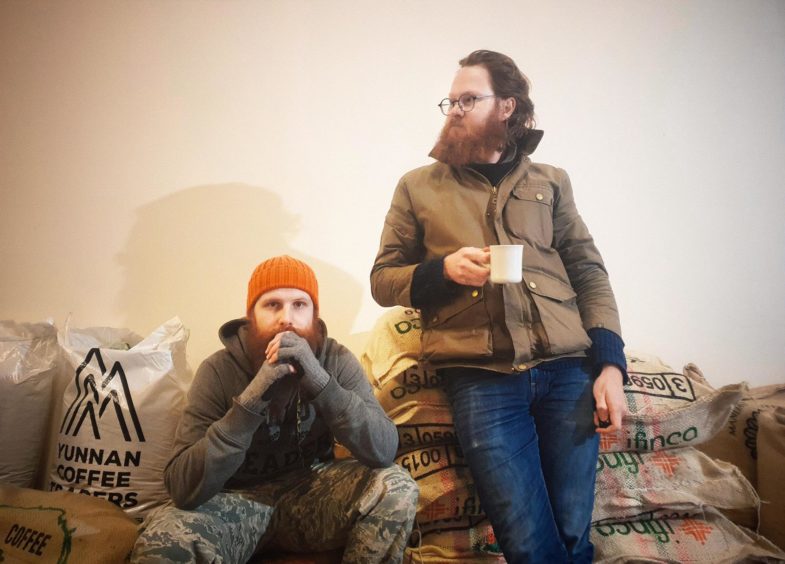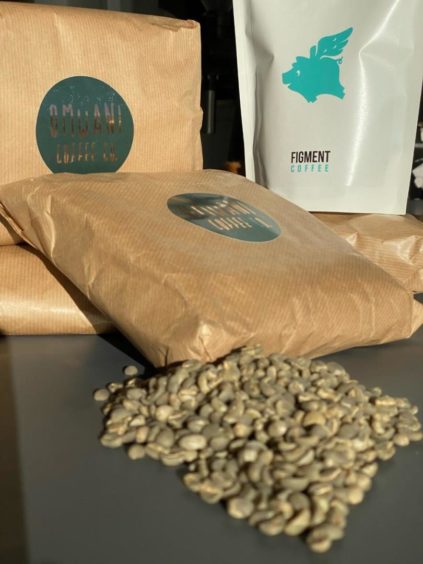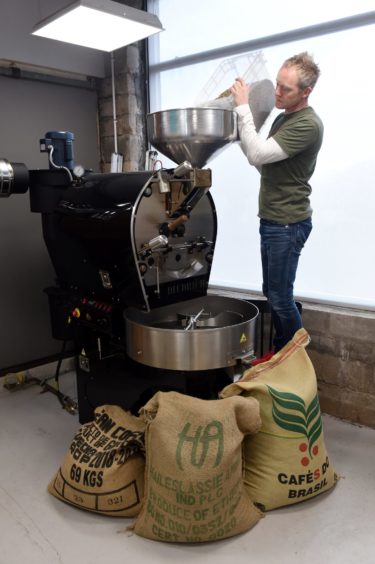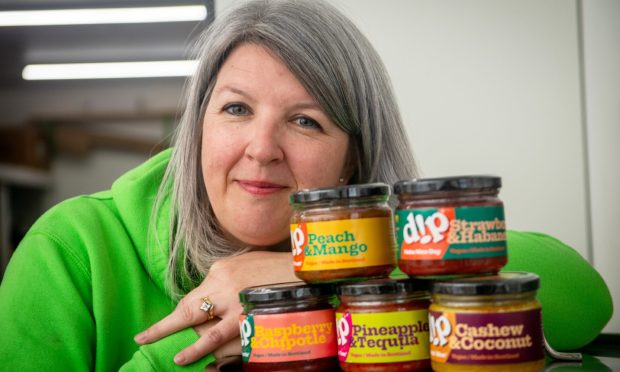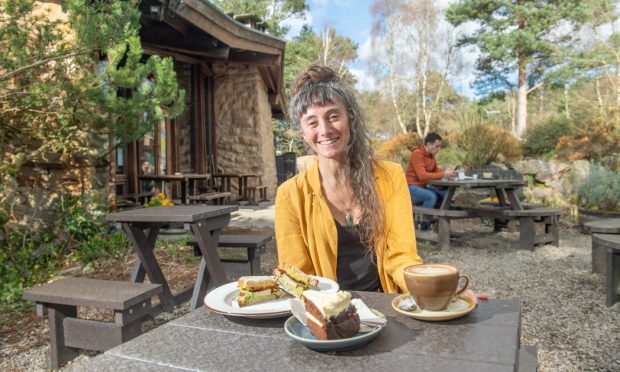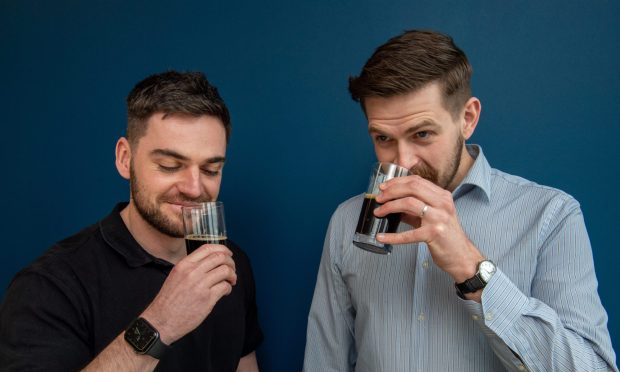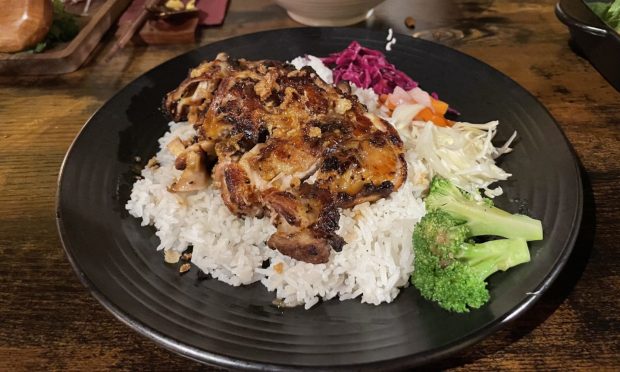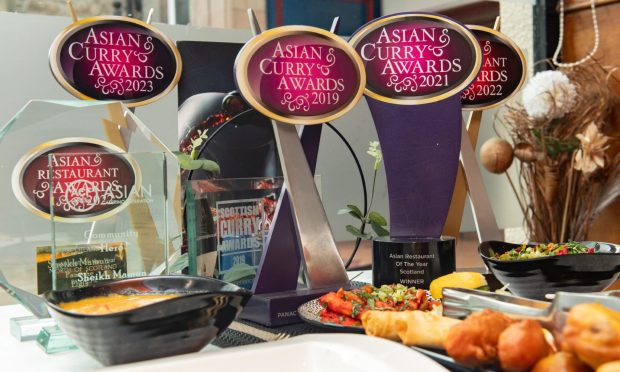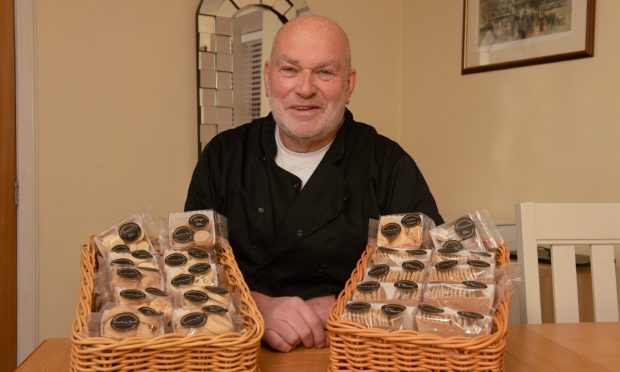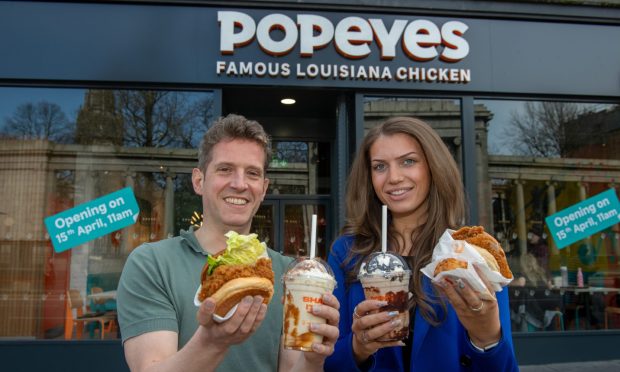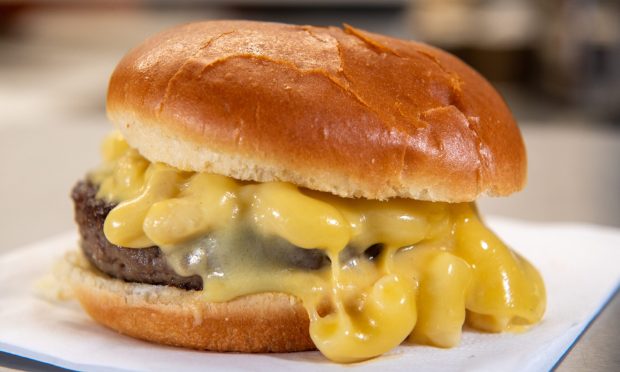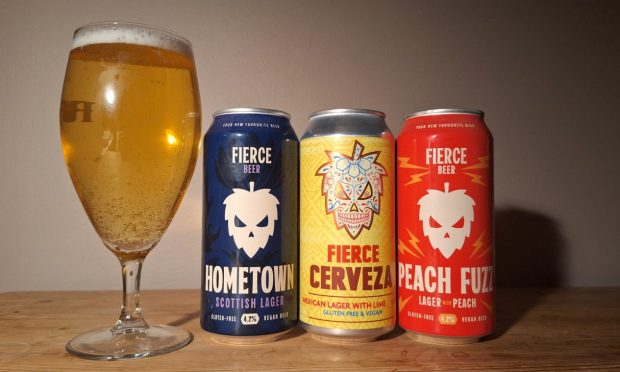Figment Coffee in Aberdeen and Manifesto Coffee in Perth each have 30 bags of the Madagascan single origin to sell, from which they hope to help establish a thriving industry in the African nation.
Two Scottish coffee roasters have teamed up to sell a unique coffee that will help build up the coffee growing industry in the African nation of Madagascar.
Aberdeen-based Figment Coffee and Perth’s Manifesto Coffee are the only Scottish roasters taking part in the project, with another four from around the UK also chosen to participate.
Organised by London-based Omwani Coffee Co, who support relationships between coffee growers in East African countries and the UK market, the project aims to help the industry in Madagascar match that of Kenya and Ethiopia, starting with the island’s own Zebu Estate.
Limited edition
A limited amount of coffee sourced from the Zebu Estate was launched on the Figment and Manifesto websites yesterday, with the aim of showing farmers on the estate how beneficial the UK market can be when it comes to producing good-quality coffee.
Neil Glover, owner of Figment Coffee, said that the collaboration came about after he was approached by Omwani.
Neil said: “We hadn’t really worked with Omwani before but we tried some of their coffees and liked them. They just approached us as I guess they could see that we were trying to do things a little bit differently, we’re focused on quality and not getting hung up on putting the cheapest coffee out. I think they liked that we were looking to do things the right way.
“I think that ethos must have come across from our Instagram and other social media pages. But Omwani just approached us and said they had this interesting project and would we be interested in it.
“They started to share some information and the more we heard about it, the more exciting it seemed for us. We are trying to raise our profile and become a global-quality roaster, so this seemed like an amazing opportunity.”
Alex McIntyre, co-founder of Manifesto Coffee, said that following the initial contact from Omwani, Neil, who he had never met before, approached him to ask if they wanted to collaborate on the project.
Alex said: “For us it was a pretty exciting opportunity, particularly because we’re quite a small roaster, so the idea of helping a new coffee farm and helping establish a specialty industry over there is pretty exciting.
“We’d received a list of the roasters who are involved in releasing the coffee. Some of the other roasters chose to release their batch of the coffee whenever they wanted. But Neil reached out to me to ask what my thoughts were and we decided to coordinate our launch and share resources as we were the only Scottish roasters that were involved.
“We only started in March last year, at the very start of the lockdown, so since starting we haven’t really had an opportunity to go anywhere and meet other roasters so this had been the first time I’d met Neil.”
On approaching Alex for the co-ordinated launch, Neil said: “Alex and I had never met and only really started talking at the tail end of last year about trying to do something to help raise the profile of Madagascan coffee and of specialty Scottish coffee roasters.”
Supporting the cause that Omwani portrays was an easy decision for the duo as some of the money raised from sales of the coffee will go to teaching farmers in Madagascar how to grow good-quality coffee and approach the international markets.
Neil said: “It’s a really lovely coffee but this isn’t just about its taste. It’s about the project behind it, and what we’re trying to do with the coffee. People who buy this coffee are genuinely doing good – they’re supporting a new project which will, in time, potentially support an entire community to improve their lives.
“This is trying to build a trade in which there is a mutual benefit, both for the people who are drinking amazing, interesting and unique origin coffee, and also for the farmers as it’s effectively doubling their income in a year, if we can get this off the ground.
“But this is just the start, and it’s almost like we are trying to prove the concept works. If we can do that and the farmers can actually see that this is working for them, then it builds from there.
“Omwani will also be giving arabica trees to a number of farmers in Madagascar, to try and encourage them to plant them and grow them and to help raise the quality of the coffee and increase the volume of specialty coffee, so that we then have more to sell next year.”
The project
The Zebu Estate in Madagascar is the only place on the island growing any kind of Arabica coffee, which is a high-quality bean that creates equally delicious coffee. Omwani will help make the estate a central hub for the nation’s coffee producing, but want to get more farmers from further beyond the estate involved.
Neil continued: “Around 92% of Madagascar’s coffee is Robusta, which is the low-quality, commodity-priced, very cheap coffee. So by changing more of their farmers over to specialty coffee and showing them they can get more value from that, they will then start to feed that back into the Zebu Estate, which will go into training and education and introducing new working practices so that the quality of the coffee continues to grow.
“Our favourite coffees are Kenyan and Ethiopian, on the east of Africa. Madagascar is an island that, at one point, would’ve been connected to that so it already has amazing growing conditions and amazing potential but is just nowhere near reaching it. So if we can start to produce coffees like they have in Ethiopia and Kenya, it could be sensational.”
But how will it work? While the project is starting out, the roasters involved have been sent a small amount of the coffee which will retail a lot higher than they usually price their products at. But both Neil and Alex highlight the fact that customers won’t just be purchasing a great-tasting coffee, they’ll be investing in a worthwhile project to help build Madagascar’s coffee industry.
“We’ve been sent 5kg of this coffee each. Normally when we buy a bag of coffee, it would be 60-70kg at a time and we’d roast a minimum of 7kg at a time,” said Neil.
“So this is a tiny amount of coffee that we have, which makes it very rare at this moment but it also leads to challenges of its own in terms of us having to be very careful in how we roast it.”
Trade, not charity
He continued: “It’s trade, not charity, which is another thing that really excites me about this. It’s not asking people for money one time then going back to them again and again.
“Both ourselves and Manifesto launched the coffee online yesterday. Through Omwani we agreed a retail price so that there is transparency and that they can guarantee the farmer is going to get a certain amount. It’s in the region of £30 for 125g. Our usual range of coffees go from £9 to £14 for 250g.
Alex said: “We will only have 30 bags of it for sale and we’ll be charging £30 per bag. All the roasters involved paid £600 for 5kg and from that each of the roasters will have about 30-32 bags in 125g size. There’s not much available.
“We are adding a bit of money so we are making a profit from it but we’re not going to be hitting what you’d expect in terms of margins.
“If you were to ask me directly whether the price reflects the taste, I would say no. I’ve tasted very expensive coffees before and the value in what you pay in some coffees is far more obvious. For this one, you’re not just paying for the coffee, you are paying for so much more.
“We try to have as much transparency as possible with all of our coffee offerings. The Madagascan is a very unique aspect of that. But it’s also unique in that it’s our first more or less direct relationship with a farm where we’re helping them out.
“I hope people appreciate what it’s about. What we do is already at the upper end of what people expect to pay for coffee, though for the most part people are used to supermarket prices and what we do is already beyond that.
“There have been articles already written about very expensive coffee and whether it’s worth it but this coffee is special in that the value of it isn’t so much in the taste of the coffee, it’s so much more than that. It’s helping out the farmers in a very, very big way and helping to establish a whole industry in a country. We’re not asking people to buy this based on how it tastes in the cup, though it does taste delicious.”
The Madagascar coffee is available while stocks last from Figment here and Manifesto here.
